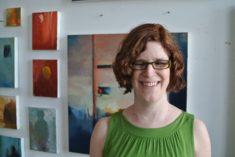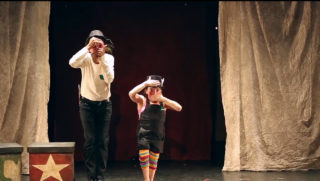Annie Leist is an artist, born and raised in North Carolina, and currently based in New York City. She pursued undergraduate study at Wake Forest University, double-majoring in studio art and mathematics. As a Rotary Ambassadorial Scholar she studied semiotics and cultural theory at Trinity College in Dublin, Ireland. She went on to earn a Master of Fine Arts degree in visual art from Rutgers University. Her paintings, inspired by her limited visual perception of light and life in urban spaces, can be seen in numerous public and private collections, as well as on her website http://www.annieleist.com.
In parallel with her artistic career, Ms. Leist works in the accessibility field, specializing in enriching the cultural experiences of people with disabilities, and has significant expertise in working with individuals with vision loss. She has consulted and facilitated trainings at several institutions, including the Museum of Fine Arts and the Institute of Contemporary Art in Boston, MA; Crystal Bridges Museum of American Art in Bentonville, AR; John G. Shedd Aquarium in Chicago, IL; the Seattle Art Museum in Seattle, WA; the Museum of Fine Arts in Houston, TX; the Fine Arts Museums of San Francisco, CA; Grounds for Sculpture in Hamilton, NJ; the John F. Kennedy Center for the Performing Arts, the Smithsonian American Art Museum, and the National Portrait Gallery in Washington, DC; and the Solomon R. Guggenheim Museum, the Whitney Museum of American Art, the New Museum of Contemporary Art, the Rubin Museum, the NYC Historic House Trust, and Intrepid Sea, Air and Space Museum in New York, NY. In addition, she has presented repeatedly at professional conferences including the American Alliance of Museums Annual Meeting, the Leadership Exchange in Arts and Disability Annual Conference, and Museums and the Web. Her passion for educating others about inclusive practices also extends to an interest in the role that existing and emerging technology can play in improving accessibility for all groups.
Ms. Leist currently serves as Special Projects Lead at the New York-based nonprofit Art Beyond Sight, where she leads their consultancy and training arm, and spearheads initiatives related to accessibility and inclusion in contemporary visual art. She is also a museum educator at the Metropolitan Museum of Art working primarily with access audiences, and sits on the steering committee of the Museum Access Consortium.

